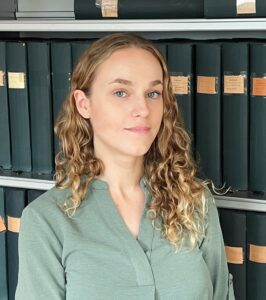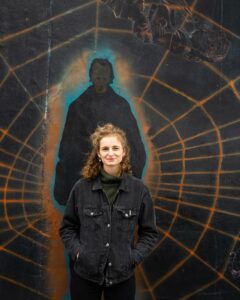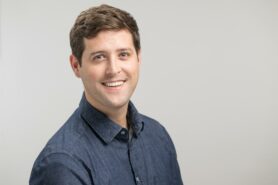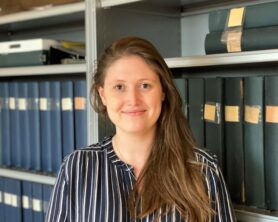Scoop projects
Within our group we have several PhDs writing dissertations within the framework of the SCOOP programme. The overall theme is sustainable cooperation but within that the six PhDs currently working on their manuscripts focus on very different topics. Four of the six are introduced below (Silke Baas – on gendered occupational stereotypes in The Netherlands, Claudia Hacke – women in family firms, Aaron Roberts – looking at who participates in cooperatives and Chris Vlam – on the role of the associative order):
Silke Baas

I am Silke, a PhD candidate at Utrecht University, working in the Economic and Social History department since March 2022. Before joining my lovely colleagues in Utrecht, I studied at the University of Amsterdam, where I did a bachelor’s in Sociology and completed a research master’s in Social Sciences. My academic interests center around gender inequality within Dutch society, the gendered division of paid labor and unpaid care work, and the organization of gender-inclusive healthcare.
My PhD project aims to determine the historical origins of gendered occupational stereotypes within the Dutch medical sector, how and why they change over time, and how they affect the majority gender shares of medical specializations. Additionally, the project examines how gendered occupational segregation affects the (self-)perceived status of specialties, the relative remuneration of male and female physicians and the work culture within medical disciplines.
Through an interdisciplinary lens combining findings from economic and social history, sociology, and social psychology, this project looks at the impact of gender stereotypes, social and institutional change, and group identification processes on women’s entry into the medical sector during the past century. It aims to explain how specific specialties have come to be associated with male or female practitioners. Studying the origins of these associations helps us understand the development of stereotypes over time, how they are intertwined with our perceptions of what makes successful physicians, and under what circumstances gender stereotypes are challenged.
Project website:
Claudia Hacke

Hi! My name is Claudia Hacke. In June of 2022, I started as a PhD candidate in the Economic and Social History research group at Utrecht University. Before this, I got a bachelor’s and research master’s degree in history at Utrecht University as well, with a focus on subjects relating to (in)justice and (in)equality.
My research project focuses on women in family firms and aims to investigate whether these firms are more conducive to gender equality in the workplace than firms without a family background, using the case of the Netherlands from 1900 to 2020. Labour censuses of the second half of the 20th century show us that thousands of women have worked in the firm of a family member. There remains ambiguity, however, on these women’s opportunities. On the one hand, family businesses may be (and have been) an opportunity for women to work, earn a living, and develop certain skills – especially in the past when women’s other options were more limited. On the other hand, literature shows that family firms can be restrictive to women’s work and opportunities, for example in the context of succession practices, suggesting that women may have (had) more chances outside of the family firm. This research will use an historical lens to investigate how and why family businesses influence gender equality differently than non-family businesses, hereby aiming to contribute to the research theme of gender in the labour market in the fields of economic and business history.
The project is part of the research programme SCOOP (Sustainable Cooperation): Roadmaps to Resilient Societies, a joint initiative by the University of Groningen and Utrecht University. My supervisors are dr. Selin Dilli (UU), prof. dr. Elise van Nederveen Meerkerk (UU), and prof. dr. ir. Tanja van der Lippe (UU).
Link to SCOOP project page: https://scoop-program.org/program-projects/748-6-7-project-1-a-historical-lens-on-family-firms-and-gender-equality-in-the-netherlands-1900-2020
Aaron Roberts

My name is Aaron Roberts, and I am a new PhD Candidate in the Economic and Social History research group at Utrecht University. My PhD project seeks to understand why citizens from different income and social groups cooperate in some contexts but not others. The United Nations declared 2012 the ‘International Year of the Cooperative’, and yet, the scholarship on cooperatively organized institutions, and how they impact socio-economic development, tell two different stories. One story is that the cooperative enterprise attracted members from different income groups and had positive impacts on inclusive development in Western Europe. Another is that cooperatives in the Global South were fraught with corruption and have prolonged socio-economic inequities since their inception. Whereas an established literature examines the sources of inclusive participation in Western Europe, the sources of conflict and inequity within cooperatives in the Global South are relatively unknown. The project, using an interdisciplinary approach and through a comparative analysis of cooperatives in India, Java and West Africa, between 1900 and the present-day will illuminate new avenues, and their policy implications, to explain this under-researched issue.
The project is part of the research programme SCOOP (Sustainable Cooperation): Roadmaps to Resilient Societies, a joint initiative by the University of Groningen and Utrecht University. My supervisors are dr. Maanik Nath at History (UU), prof. dr. Elise van Nederveen Meerkerk at History, (UU) and prof. dr. Vincent Buskens at Social and Behavioral Sciences (UU).
Link: https://www.scoop-program.org/program-projects/785-cooperationcooperatives-and-development
Chris Vlam

Hi, my name is Chris Vlam. I am a PhD candidate in the Economic and Social History research group at Utrecht University and started my position on September 15th, 2022. I have a bachelor’s in history and a bachelor’s and research master’s in economics. I am interested in long-term economic development and the role of actors and institutions, especially in relation to societal and individual well-being, as well as studying the consequences of structural transitions and disruptive changes.
My PhD project aims to investigate the development of the associative order and possible transitions between the market, state, and associative order and its effect on general well-being in the Netherlands from 1848 to 2020. In varying mixes and compositions, these order types can take on different forms. Where in some countries, the state is the main coordination system (state-led economies), in others, it is the market (free-market economies), and sometimes it is the associative order (inter- and intra-organizational cooperation) that dominates the allocation of resources and coordination of the economy. In the Netherlands, previous political and economic history research indicates the importance of the market or associative order during the 19th and 20th centuries and shifts between them. The purpose of this project is to examine the development of the Dutch associative order to improve our understanding of the role associations play in economic development, policy formulation, and citizens’ well-being. Using a long-term historical approach, attention is given to the internal cooperative dynamics and diversity of the associative order at the meso-level of society, and how these dynamics affect the macro-level of society.
The project is part of the research programme SCOOP (Sustainable Cooperation): Roadmaps to Resilient Societies, a joint initiative by the University of Groningen and Utrecht University. My supervisors are prof. dr. Bas van Bavel (UU), dr. Selin Dilli (UU), and prof. dr. Rafael Wittek (RUG).
Project specific webpage: link

